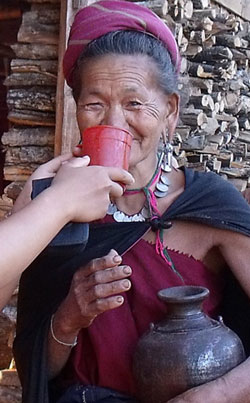A Kayah woman, Daw Saw Mae, in her forties, is busy in the kitchen. Her eyes narrow as she focuses her attention on her work and her forehead, damp with beads of sweat, is lined with deep furrows. She has worked in the kitchen since early morning...
A Kayah woman, Daw Saw Mae, in her forties, is busy in the kitchen. Her eyes narrow as she focuses her attention on her work and her forehead, damp with beads of sweat, is lined with deep furrows. She has worked in the kitchen since early morning.
 She has no time to take a rest. She patiently takes cups of boiled reddish- brown sticky millet paste from a big cooking pot and places them on a large bamboo mat to cool. Then she sprinkles yeast powder over the concoction.
She has no time to take a rest. She patiently takes cups of boiled reddish- brown sticky millet paste from a big cooking pot and places them on a large bamboo mat to cool. Then she sprinkles yeast powder over the concoction.
I approach her and ask, “What are you doing aunt?” Even though she is very busy, she smiles at me and answers, “I am making traditional millet wine from this paste. In ten days it will turn to liquid.” She plans to sell the wine next week at the De Maw So market, near Loi Kaw, in central Kayah State .
Later, she collected the cooled mixture of yeast and millet in a bamboo basket lined with large green Inn-leaves.
“Liquid will drop down soon. I have to collect the liquid in a pot. After one night, I can put the maze mixture with yeast in the big pot. After about 10 days, I can take the liquid. It’s the first stage of millet wine. Then I have to add boiling water to the pot and warm it for a night near the fire. The next day, I have to add more boiled water. It becomes Kayah millet wine,” she said.
“When we drink the millet wine, we feel warm inside the stomach.”
 The traditional Kayah wine is very important for Karenni people as they practice hospitality. They build friendships by drinking Kayah wine together. It is the main drink for Karenni people, who use the wine as herbal medicine. They treasure it as an important part of their cultural heritage, according to cultural expert Khu Reh.
The traditional Kayah wine is very important for Karenni people as they practice hospitality. They build friendships by drinking Kayah wine together. It is the main drink for Karenni people, who use the wine as herbal medicine. They treasure it as an important part of their cultural heritage, according to cultural expert Khu Reh.
“Karenni people have drunk the wine since the time of Khwe Saw Phyar, a kayah leader. They drank the wine as herbal medicine when they fought with the Yun people. Our Karenni people are very familiar with the wine. Karenni people have kept the tradition for many years, but they did not drink too much”, he said.
Today, many people make the wine and sell it in the market as a business.
However, some older Karrenni say young people drink too much of the traditional wine during festivals, causing them to get drunk. They say this is a misunderstanding of the tradition of drinking the Kayah wine.
“I have drunk the wine every day since I was young. Now I am 70 years old. I don’t drink too much. It helps blood circulation system. However, some people drink wine too much, mixing it with alcohol. It’s not good for them,” an elderly Karenni woman said.
The wine has no side effects. However, a health worker said it can cause diarrhea if measurement is wrong when preparing the mixture of yeast and boiled millet. As well, drinking too much can cause diarrhea.
“It can be medicine if you don’t drink too much,” he said.
Farmers are tired and hungry after they work in their farms for the whole day. So, they often drink the wine to renew their strength.
The wine was used when Karenni people defeated the defeat of the Yun people in battle more than century ago. Then they drank the wine and ate sticky rice packed with Dee Ku leaf.
 Today, young women provide the wine in bamboo cups to visitors during the annual celebration of the victory over the Yun.
Today, young women provide the wine in bamboo cups to visitors during the annual celebration of the victory over the Yun.
As well, Karenni people offer rice, curries and traditional wine to visitors to the “Traeilu Festival”, held in April. And, many people drink the Kayah wine during water festival.
“When we meet, we drink the Kayah wine together. It makes us very friendly,” Ko Key Reh, a Karenni song writer said.
“All people have their owned culture, like green tea for the Shan, green tea and tea-leaf salad for Burmese, wine for the English. For Kayah people, it is the traditional Kayah wine,” he added.
Karenni people offer pork, chicken, rice and the traditional wine during annual spiritual sacrifices, too. They believe it can help them to be successful and keep safe from danger.
“The traditional wine is an essential thing for holding spiritual events. It’s our tradition,” U Byar Reh, who is over 60, said.
Kayah wine cannot be kept more than 3 days, but the first stage liquid can be kept many days. That early stage millet wine is much better and more expensive. It sells for 1,000 Kyat for one liter; compared to 500 Kyat for the final product.
The wine can be made with rice instead of millet, but it is not considered to be as good. The millet wine is sweet and very tasty.
Some people like to drink fresh wine from the pot, by using a bamboo-pipe.



